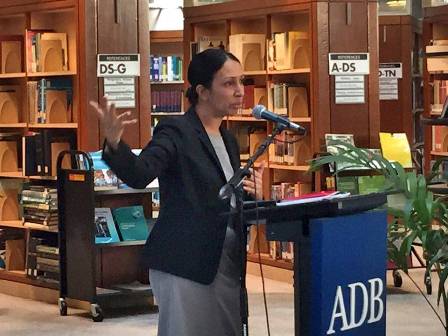By Che Caparas
 The World Bank Group released the latest edition of its Women, Business and the Law report, which underscores the legal barriers that limit women’s earning capacity in more than 173 countries.
The World Bank Group released the latest edition of its Women, Business and the Law report, which underscores the legal barriers that limit women’s earning capacity in more than 173 countries.
The report found that legal gender differences are widespread: 155 of the 173 economies covered have at least one law impeding women’s economic opportunities. For example, in the Russian Federation, occupational gender segregation is widespread, where women are restricted from holding particular jobs and are encouraged to concentrate in the health care, education and light industries. This resulted in high gender earnings differential as women are confined to lower-paying sectors and activities.
In a recent seminar at the ADB Headquarters in Manila, Sarah Iqbal, program officer at the World Bank, elaborated on how being a woman could also mean paying disproportionately higher taxes, as in the case in countries including Brunei Darussalam, Cambodia, Fiji, Indonesia, the Lao People’s Democratic Republic, Malaysia, and the Philippines, where tax provisions directly favor men. These economies either grant men an explicit tax deduction or credit, or an implicit tax deduction or credit is granted to the male head of household. Only Israel, Singapore and Spain provide a specific tax credit or deduction to women.
In Israel, the government grants personal tax credits that reduce the amount of tax of women depending on their marital status and number of children. Israeli women who want to open their own business can also avail of a free or discounted “coaching” and/or mentoring by a business consultant provided by the government.
Meanwhile, in Singapore, the government provides a Working Mother's Child Relief (WMCR) benefit to encourage married women to remain in the workforce after having children. Spanish women, on the other hand, are given tax deductions of up to 2,500 euros, from when they give birth until their child reaches 3-years-old.
The report also underscored how violence can undermine women’s economic empowerment by preventing employment and blocking access to other financial resources. Women in Tanzania, for example, earn 60% lower if they are exposed to severe partner violence than women who are not exposed. Research also showed that economic empowerment seems to protect women from violence: women living in wealthier households have a 45% lower risk of violence than those living in poorer households.
The forum is part of the Asian Development Bank’s gender equality and women’s empowerment workshop. The report can be downloaded here.





 The
The 
 Isis Resource Center holds one of the largest feminist collections of materials in the Global South. With 40 years of publication experience, Isis holds a vast collection.
Isis Resource Center holds one of the largest feminist collections of materials in the Global South. With 40 years of publication experience, Isis holds a vast collection.